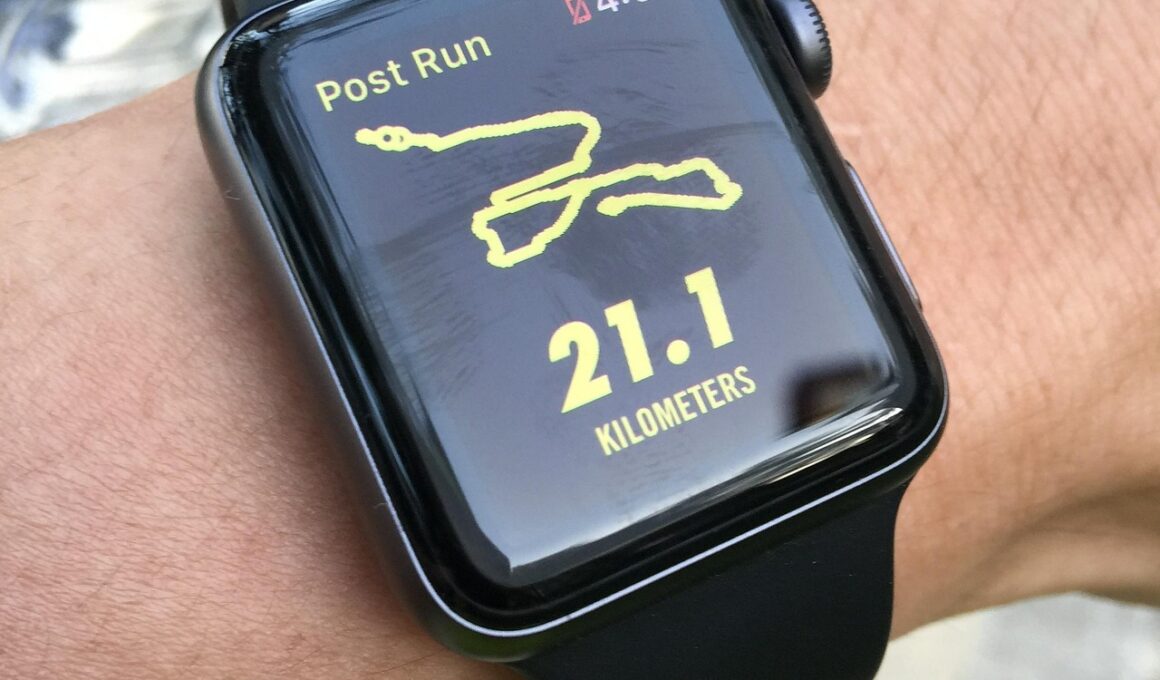Using Technology to Enhance Your Marathon Training
In the world of marathon training, technology has become a vital component for runners looking to improve performance. With various devices and applications available, the ability to track, analyze, and enhance your training program is more accessible than ever. Wearable technology, such as GPS watches and heart rate monitors, enables runners to gather precise data about their distances, pace, and calorie burn. This information helps runners set realistic goals and adjust their training plans according to their progress. Incorporating fitness trackers into your regimen can provide insights into your overall health, including sleep patterns and recovery times. Understanding these metrics can significantly influence your approach to marathon preparation. Utilizing mobile applications can also offer personalized training plans tailored for beginners. Many apps allow users to visualize their progress, set reminders for workouts, and share achievements with friends. The integration of technology equips runners with real-time feedback, fostering a sense of community and competition. Embracing these tools will undoubtedly elevate your marathon training experience, ensuring you reach the finish line with confidence.
Another crucial element of using technology in marathon training is engaging with online communities and forums. These platforms provide a valuable source of motivation and support for beginners embarking on their running journey. Many websites house forums where runners share training experiences, discuss challenges, and offer advice. By participating in these communities, novice marathoners can access a wealth of information about training techniques, nutrition, and recovery strategies. Additionally, connecting with experienced runners on social media can lead to encouragement and accountability. Social media platforms often post tips and success stories, inspiring beginners to persevere through difficult training sessions. Beyond just conversation, many community platforms facilitate group training runs or virtual challenges, promoting camaraderie and healthy competition. Sharing your goals and milestones can lead to increased motivation as you witness the support from others. Engaging with fellow runners amplifies the overall training experience, as their collective wisdom can help you navigate common pitfalls. It is crucial to leverage technology to break barriers, whether through apps, websites, or social platforms, enhancing your journey toward marathon success.
Fitness Apps and Their Benefits
Using fitness applications has transformed how marathon training is approached, especially for beginners. These apps offer tailored workout plans designed specifically for novices, taking into account their fitness levels and time commitments. Many of these apps also feature guided runs led by professional coaches, which can help build confidence and ensure proper techniques. Users can track their workouts through features such as interval timers, pace calculators, and distance tracking. By analyzing this data, runners can identify strengths and weaknesses in their training regimes. Furthermore, some apps provide nutritional insights, helping users maintain a balanced diet to fuel their runs effectively. Staying hydrated and properly nourished is essential for runners, and many apps have convenient reminders for hydration and fueling. Additionally, social aspects of these applications allow users to connect with friends and share achievements, which fosters a sense of community and accountability. This social sharing element encourages beginners to stay consistent with training, as they can celebrate milestones together. Through these features, fitness applications play a pivotal role in enhancing overall marathon training experiences.
Incorporating smart devices in marathon training can lead to substantial improvements in performance and technique. Smart shoes and insoles equipped with sensors provide feedback on running form, gait, and foot strike patterns. Understanding your running mechanics is critical for beginners, as this knowledge can help prevent injuries and improve efficiency. Analyzing metrics from these devices allows runners to recognize issues early on and make necessary adjustments. Moreover, smart technology often syncs with existing fitness apps, allowing for comprehensive data analysis in one accessible location. Utilizing this technology can encourage more mindful running habits, leading to increased endurance and reduced fatigue over long distances. Additionally, some wearable devices provide motivational reminders to keep runners engaged and committed to their goals. Techniques, such as using cadence alerts, can optimize your running rhythm, thereby enhancing overall performance. As the technology continues to evolve, novices should consider investing in gadgets that prioritize improvement on both performance and injury prevention. With innovation constantly reshaping the landscape of marathon training, these advancements empower beginners to train effectively and safely.
The Role of Virtual Training Plans
Virtual training plans are an essential part of modern marathon preparation, especially for beginners. These plans provide structured schedules that gradually increase mileage, allowing novice runners to build endurance without overwhelming themselves. Many platforms offer customizable plans based on individual preferences and goals. Some even consider factors such as current fitness levels, time before the event, and personal commitments. This tailored approach ensures that runners are well-prepared when race day arrives. Additionally, virtual race simulations offered by some apps help beginners visualize race conditions, preparing them mentally for the challenges they will face. By training with a structured plan, beginners can develop a consistent running habit and minimize the risk of injury. Another key benefit is the flexibility that comes with virtual plans; runners can adapt schedules to suit their lifestyles, whether they prefer morning runs or training after work. The ability to adjust plans is crucial for busy individuals juggling various responsibilities. Embracing virtual training has undoubtedly contributed to the success of many novice marathon runners.
Furthermore, being able to record and analyze data during training sessions can provide critical insights that contribute to overall performance enhancement. Wearable technology, including fitness trackers and smartwatches, captures key metrics such as heart rate, pace, and distance. This data analysis allows runners to identify patterns, assess their performance, and make data-driven adjustments to their training regimen. By examining trends over time, runners can gauge improvements and set new goals for future sessions. It can also enable users to cross-reference their training with their nutritional intake, ensuring that they maintain an optimal balance for success. Additionally, sharing this data with coaches or fellow runners promotes a culture of continuous improvement and accountability. Many modern training applications allow seamless integration with social platforms or training logs, showcasing achievements and providing tips for improvement from a community perspective. In summary, harnessing technology not only informs training practices but also keeps runners motivated and informed. Technology has thus come to play an integral role in enhancing training for beginners competing in marathons.
Preparing for Race Day with Technology
As race day approaches, technology can further streamline your preparation process, ensuring your marathon experience goes smoothly. Utilizing apps to organize your pre-race checklist is beneficial for beginners, as it minimizes anxiety and keeps them focused on their goals. These checklists can include items such as gear, nutrition, and hydration strategies to implement on race day. Additionally, mapping out the race course using online resources can provide a mental layout that calms nerves. Understanding the course’s elevation changes and terrain helps runners plan their pacing strategy effectively. Furthermore, technology can assist in establishing a race day routine, as it allows beginners to rehearse what time to wake up, eat breakfast, and reach the starting line. By following a technology-assisted plan, novice runners can reduce uncertainty, which is often a source of pre-race jitters. Engaging with fellow runners or community groups through social media can also provide encouragement and additional race day tips. These supportive connections empower beginners to face the challenges of their first marathon with confidence and preparedness.
In conclusion, technology has revolutionized the way we approach marathon training, especially for beginners eager to enhance their performance. From wearable devices to virtual training plans, runners can leverage a multitude of tools designed to optimize their preparation. Utilizing fitness apps, engaging in online communities, and analyzing performance data allows beginners to train smarter, not harder. These advancements provide structure and accountability while offering insights into physical capabilities. Embracing technology helps novice runners confront their fears of distance running and allows for adjustments based on feedback. As innovations continue to emerge in the running space, the importance of technology in training cannot be understated. It encourages runners to push their limits and achieve their goals in a supportive environment. By integrating these tools into a training routine, beginners can feel empowered to tackle their first marathon and celebrate their accomplishments on race day. To sum up, technology enhances the overall training experience, fostering community support and making marathon training more accessible and effective for everyone. No runner should overlook the benefits of technological advancements when preparing for such a significant event.


